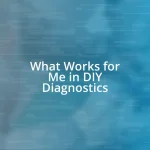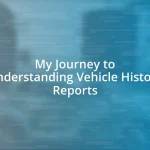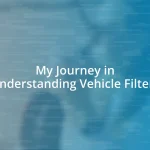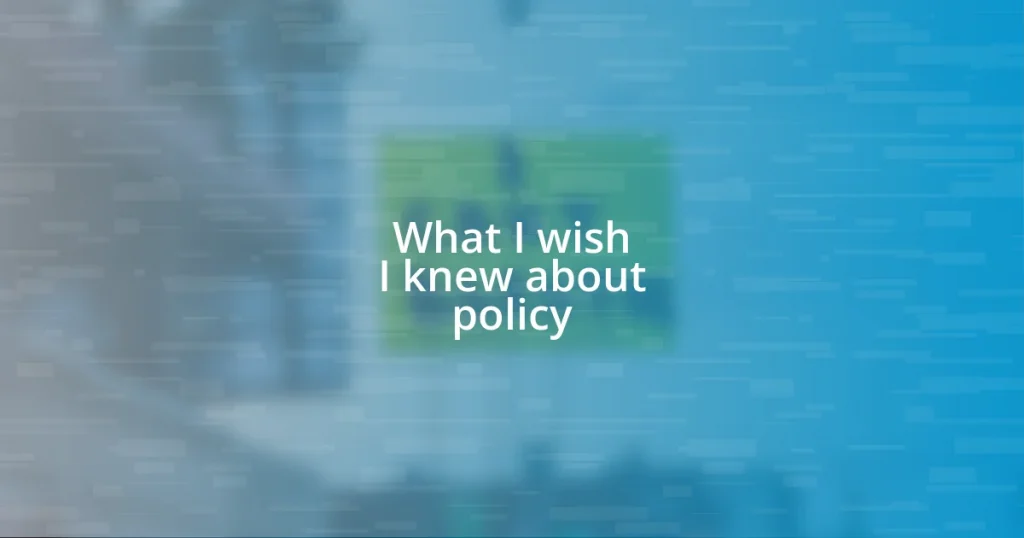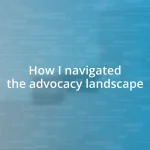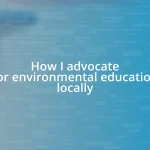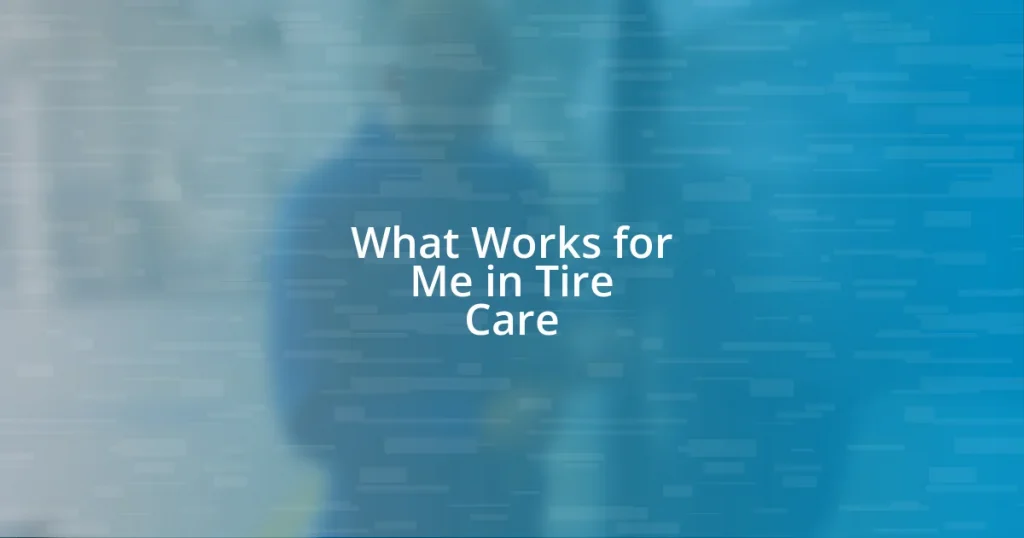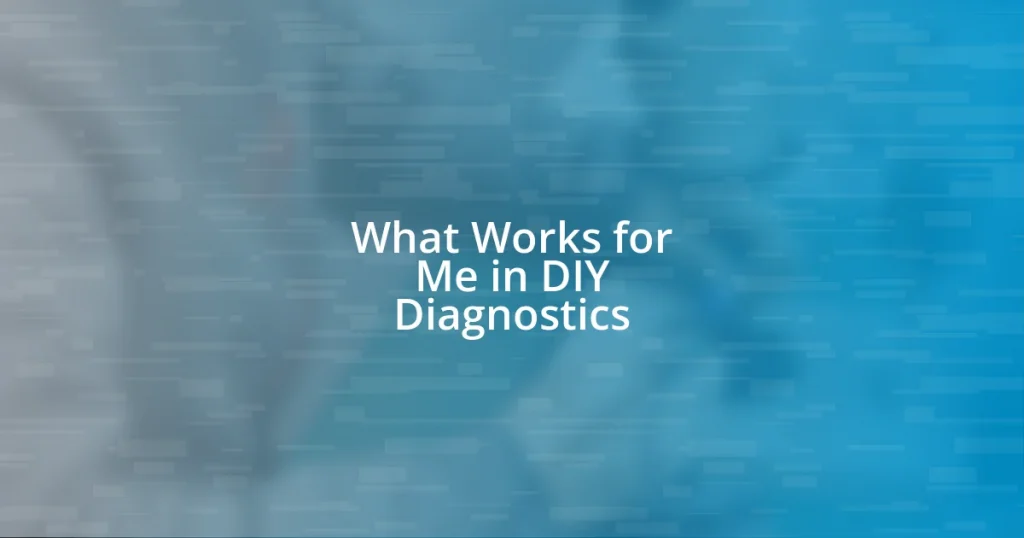Key takeaways:
- Understanding policy fundamentals is crucial for empowered citizenship and effective community engagement, as policies are shaped by diverse perspectives and complex negotiations.
- Having solid policy knowledge enhances critical thinking, informs personal choices, and enables individuals to hold decision-makers accountable for community impacts.
- Effective policy communication relies on clarity, relatability, and open dialogue, allowing for collaboration and comprehensive understanding among stakeholders.
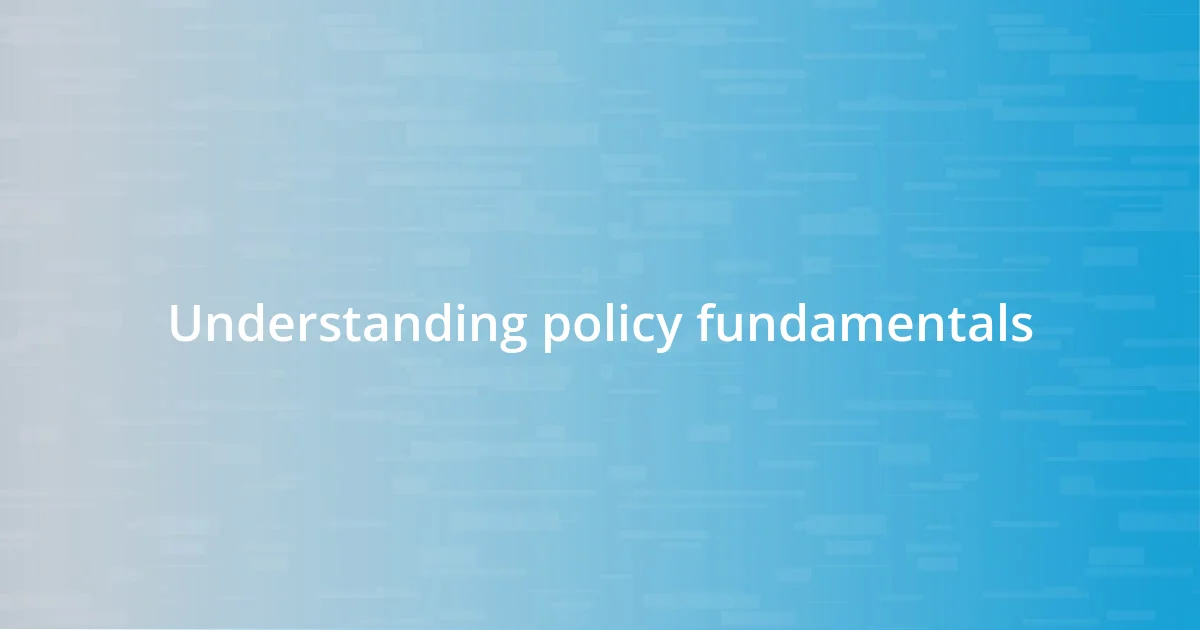
Understanding policy fundamentals
Understanding policy fundamentals means diving into the core concepts that shape our society. I remember my first encounter with a policy document—it felt overwhelming, filled with jargon and complex ideas. Why do terms like “stakeholders” and “implementation strategies” matter so much? It’s because these concepts form the backbone of how policies are created and executed, influencing everything from community health programs to environmental regulations.
The process of developing a policy is layered and intricate. I recall participating in a local town hall meeting where residents expressed concerns over a proposed policy on green spaces. Listening to the debate, I realized that understanding the motivations and needs of different groups is essential. Isn’t it fascinating how diverse perspectives can shape a policy’s direction and effectiveness? Connecting these dots not only enhances our comprehension but also makes us more empowered citizens.
Moreover, the outcomes of policies are not always clear-cut. I often think about the unintended consequences of well-meaning policies. For instance, a policy aimed at improving transportation could inadvertently increase traffic congestion. Have you ever encountered a situation where a policy had unexpected effects? Reflecting on these experiences can deepen our understanding of policy dynamics and prompt us to advocate for solutions that consider all possible ramifications.
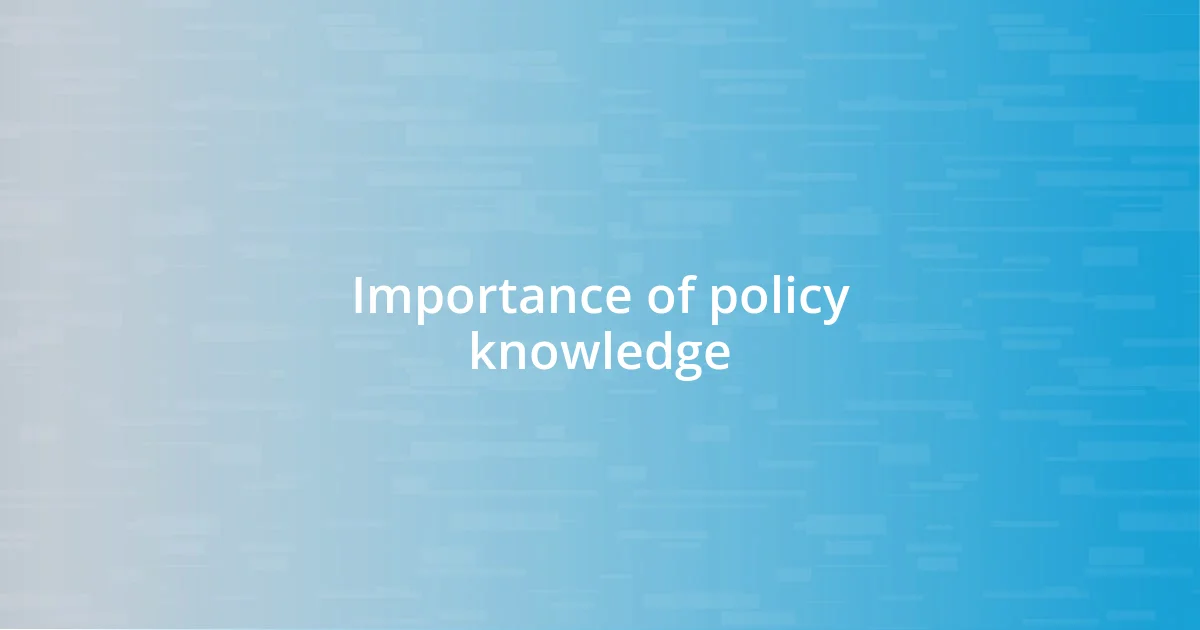
Importance of policy knowledge
Understanding the importance of policy knowledge can truly shape our engagement in society. I remember sitting in a community meeting, realizing how little I knew about the proposed education policy changes. As I listened to the discussions, the weight of knowing how these policies could affect our local schools struck me. Wouldn’t it have been beneficial to grasp the potential ramifications on funding and curriculum before that meeting? This realization drove home the fact that being informed empowers us to participate meaningfully in discussions that matter.
Moreover, having a solid grasp of policy helps us navigate the complexities of governmental processes. I once found myself confused by a policy concerning public health initiatives. Understanding the terminology made it easier for me to follow along with the conversation and even contribute. Isn’t it interesting how just a bit of knowledge can turn an intimidating topic into something approachable? Possessing this knowledge not only boosts our confidence but also encourages us to ask the right questions and challenge the status quo.
Lastly, the ability to critically evaluate policies can profoundly affect decision-making on larger scales. I recall a time when a local environmental policy was pushed forward without much community input. After delving into the details, I understood the potential impacts on our wildlife and ecosystem. It made me realize that an informed citizenry is essential in holding policymakers accountable. How can we expect meaningful change if we don’t engage with these issues directly? Each person’s understanding and vocalization can lead to more thoughtful and inclusive outcomes, ultimately beneficial for all.
| Benefits of Policy Knowledge | Consequences of Lack of Policy Knowledge |
|---|---|
| Empowers community engagement | Leads to uninformed decisions |
| Enhances critical thinking skills | Creates barriers to effective advocacy |
| Informs better personal choices | Results in missed opportunities for change |
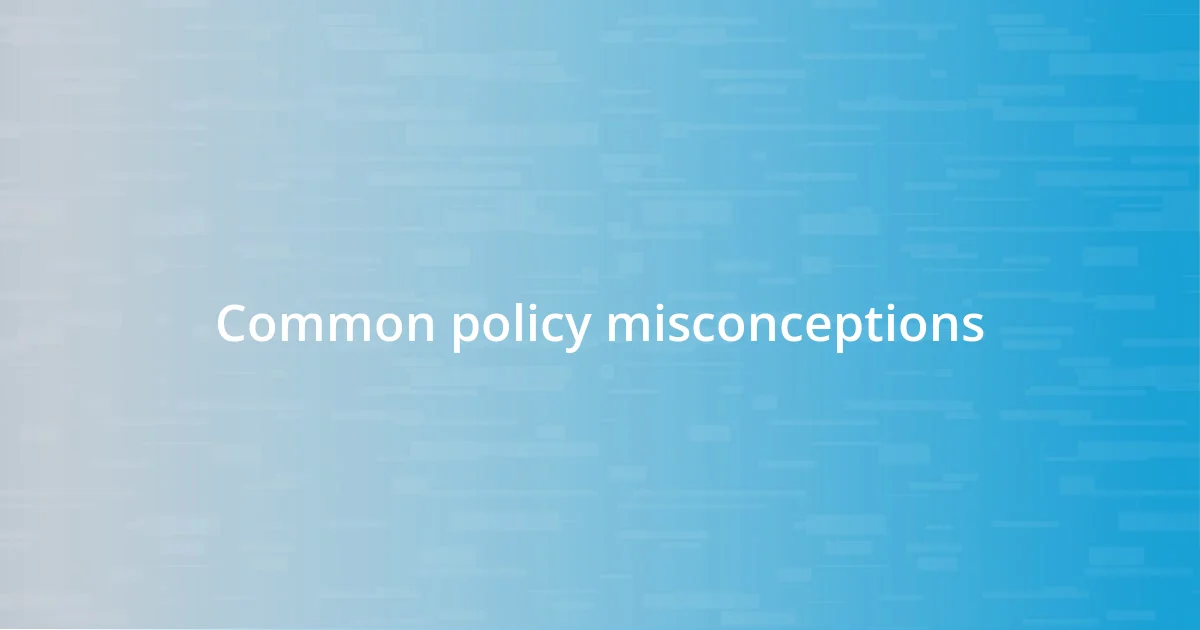
Common policy misconceptions
It’s surprising how many people hold misconceptions about policy that make it seem more straightforward than it is. I once believed that policies simply stem from good intentions, but I soon discovered that every policy is a product of complex negotiations and competing interests. For instance, during a city council meeting where a new traffic policy was discussed, I witnessed firsthand how different stakeholders – from local business owners to environmental activists – clashed over priorities. This not only highlighted the intricacies of the policy-making process but also taught me that every layer of a policy can significantly affect its implementation and reception.
Here are some common misconceptions that I’ve identified:
- Policies are straightforward responses to problems: In reality, crafting a policy involves navigating through various interests and compromises.
- All stakeholders have equal influence: Often, certain groups have much more sway than others, depending on their resources and connections.
- Public opinion drives policy decisions: While it’s crucial, it’s not the sole factor; political agendas and institutional constraints play a significant role.
Recognizing these misunderstandings helps in appreciating the delicate nature of policy development, which is far from black and white—it’s an evolving conversation filled with voices, motivations, and sometimes, contradictions.
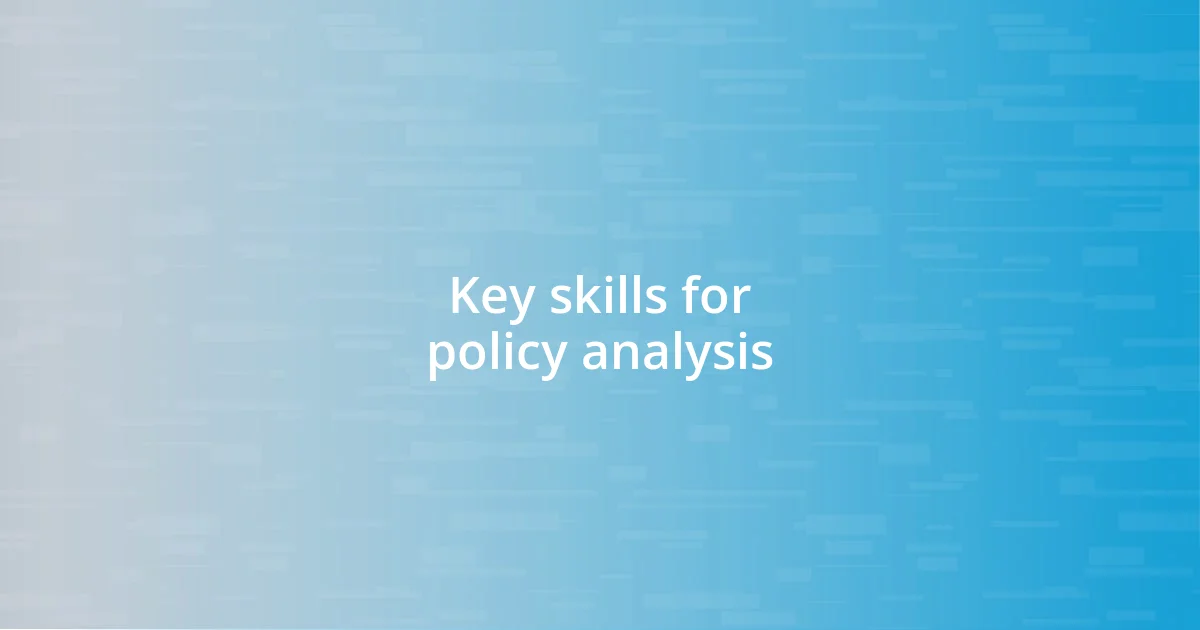
Key skills for policy analysis
When delving into policy analysis, critical thinking emerges as an essential skill. I recall digging into a healthcare policy proposal and realized how important it was to systematically evaluate its potential outcomes. The ability to dissect arguments, identify assumptions, and question the evidence being presented made me feel like a detective piecing together a puzzle. Have you ever had that moment of clarity when you connect the dots in a complex situation? It’s incredibly satisfying and can significantly inform your conclusions.
Another key skill is effective communication. I once participated in a collaborative effort to draft a new community policy. My task was to distill complex information into clear, accessible language. It was a challenge, but I discovered that articulating ideas in a straightforward manner helped bridge gaps between experts and the general public. Isn’t it fascinating how the right words can transform a dense document into a compelling narrative? Engaging diverse audiences is pivotal in fostering broader understanding and support for policies.
Lastly, understanding data analysis is crucial for any policy analyst. I remember feeling overwhelmed by the numbers in a report on urban development proposals. With some guidance, I learned to interpret the data, looking beyond the charts to grasp the underlying implications. This experience taught me that analytics aren’t just figures; they’re powerful narratives waiting to be uncovered. How can we make informed decisions if we don’t go beyond the surface? Gaining confidence in data interpretation can empower policy advocates to substantiate their positions and drive meaningful change.
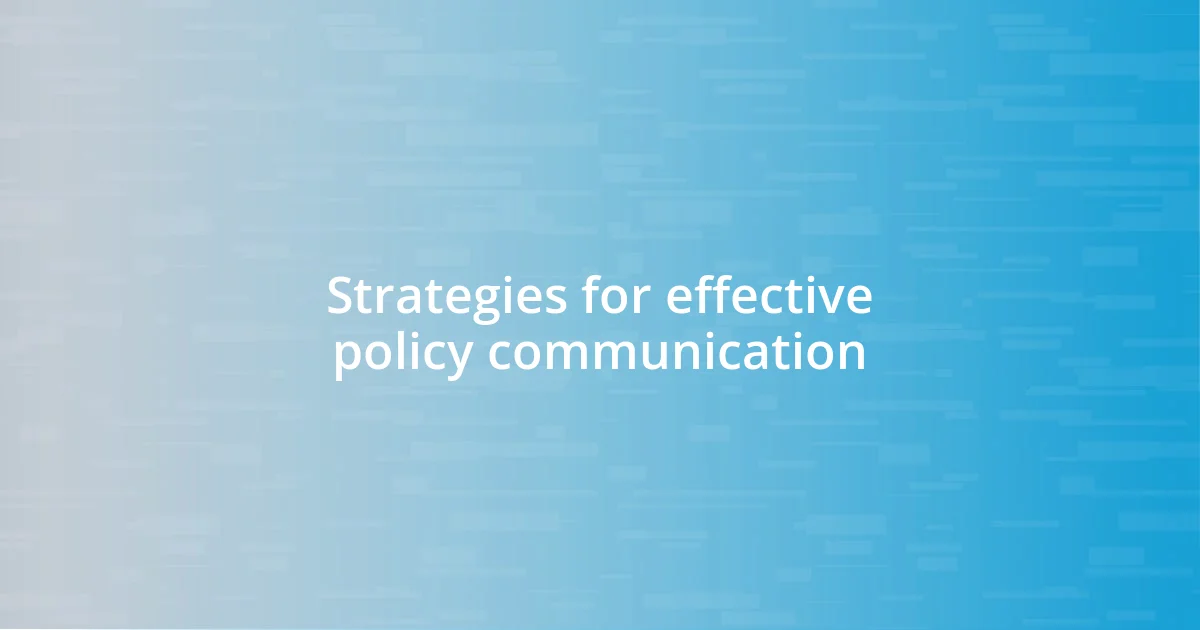
Strategies for effective policy communication
Effective policy communication hinges on clarity and relatability. I remember my first attempt at conveying a complex environmental policy. I used jargon that might impress experts but left everyone else confused. It hit me—the value of connecting with your audience lies in using straightforward language. Have you ever felt that lightbulb moment when simplifying a concept suddenly makes it click? It’s a powerful reminder that clarity can transform the way people perceive and engage with policy.
Visual aids can also play a crucial role in effective policy communication. During a community workshop, we utilized infographics to illustrate the goals and impacts of a new public transportation initiative. The energy in the room shifted as people began to engage with the visuals. It was a stark contrast to the lengthy reports we had previously shared, which often went unappreciated. Engaging, well-designed visuals not only capture attention but also simplify complex data, making it easier for diverse audiences to grasp essential ideas. Isn’t it fascinating how a good graphic can breathe life into numbers and statistics?
Moreover, fostering an open dialogue with stakeholders enhances understanding and rapport. I recall a tense town hall meeting about a proposed housing policy where, instead of simply presenting our agenda, we encouraged community members to share their thoughts and concerns. The atmosphere transformed from defensive to collaborative, revealing insights that reshaped our strategy. By actively listening and addressing criticisms, we crafted a policy that resonated more widely. How can we craft effective policies without first understanding the needs and desires of those they affect? Engaging in genuine conversations can be the key to creating more inclusive and effective policy outcomes.
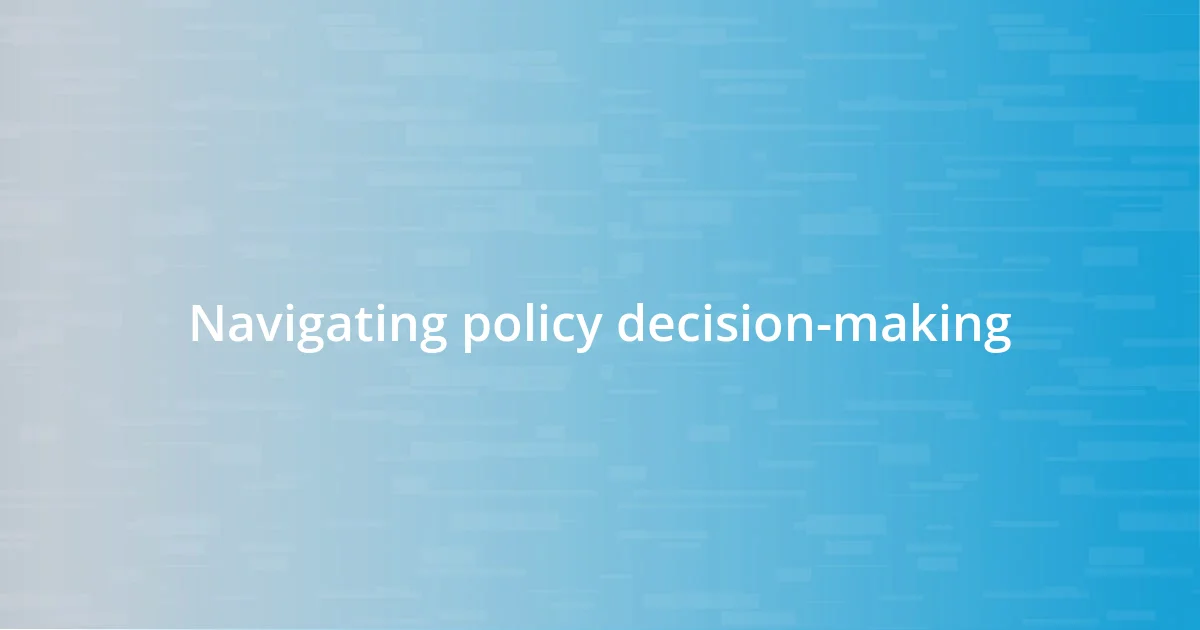
Navigating policy decision-making
Navigating policy decision-making often feels like traversing a winding road with unexpected twists and turns. I remember a particularly challenging moment when I was part of a committee tasked with addressing local environmental concerns. Each member brought their own perspectives and biases, making consensus hard to reach. It made me realize how crucial it is to identify common goals and actively seek out the voices of those directly impacted. Have you ever felt lost in a sea of opinions? It’s in those moments of confusion that genuine collaboration can truly illuminate the path forward.
Balancing competing interests is another vital aspect of effective policy decision-making. I once found myself in a heated debate between business owners eager for deregulation and environmental advocates pushing for stricter controls. It was taxing but also enlightening. I learned that bringing everyone to the table can unearth innovative solutions that satisfy multiple stakeholders. Isn’t it interesting how a conversation that starts with conflict can end with mutual understanding? These discussions taught me that compromise doesn’t have to dilute a policy’s integrity; rather, it can enrich it.
Lastly, I’ve discovered that patience plays a pivotal role in the decision-making process. Early in my career, I was eager to push through initiatives without fully understanding the implications. One project took longer than expected, but in that time, we gathered invaluable feedback and insights that ultimately strengthened the proposal. Reflecting on it now, I see how a measured approach can lead to more sustainable and effective policies. How often do we rush decisions only to revisit them later? Taking a step back to listen, analyze, and adapt can be the key to truly impactful policy-making.



